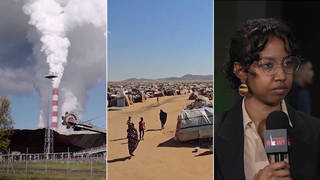
Guests
- Shira Scheindlinformer United States district judge for the Southern District of New York. She is a member of the executive committee of the board of the Lawyers’ Committee for Civil Rights Under Law.
We speak with Judge Shira Scheindlin, former United States district judge for the Southern District of New York, about her role in a case that found the controversial police policy of stop-and-frisk unconstitutional. While running for president, Donald Trump called for a nationwide stop-and-frisk program. “It was a bad policy,” Judge Scheindlin says. “It was not effective law enforcement … It obviously wasn’t deterring crime. All it was doing was alienating the community from the police.”
Transcript
AMY GOODMAN: This is Democracy Now!, democracynow.org, The War and Peace Report. I’m Amy Goodman, with Juan González. Our guest is the former district Judge Shira Scheindlin, who’s written both pieces in The New York Times and in The Guardian about her concern about Trump’s nominees and shaping of the federal court in just his first year in office. Juan?
JUAN GONZÁLEZ: Well, I wanted to ask you about something else. In January of 2014, New York City’s newly elected Mayor Bill de Blasio announced the city would drop its appeal of a ruling by a U.S. district court that found the controversial policy of stop-and-frisk unconstitutional, and he would settle an ongoing lawsuit. Mayor de Blasio delivered the news at a community center in Brownsville, Brooklyn, a predominantly African-American neighborhood that’s had more stop-and-frisks than any other part of the city.
MAYOR BILL DE BLASIO: We believe in ending the overuse of stop-and-frisk, that has unfairly targeted young African-American and Latino men. We believe in our obligation, the most fundamental one that there is in government, to keep people safe. And the values and strategies that keep people safe and that really give us lasting safety, those values are not compatible with a broken and misused stop-and-frisk policy.
AMY GOODMAN: That’s Mayor Bill de Blasio talking about a case overseen by our guest, federal Judge Shira Scheindlin, former U.S. district judge for the Southern District of New York, where she served for 22 years, was appointed by President Bill Clinton, member of the executive committee of the board of the Lawyers’ Committee for Civil Rights Under Law. This was a huge decision. I mean, the number of young black and brown, usually men, we were talking about—what?—700,000 or more a year, a kind of initiation, as they became 10, 11, 12, 13 years old. Talk about your decision.
SHIRA SCHEINDLIN: First of all, it was the most important decision I wrote in all those years. It was a very, very major case, because it affected the lives of so many hundreds of thousands of New Yorkers. And I put many years into that case and studied the problem deeply. And what was very satisfying about that case is that I found the stop-and-frisk effort, as practiced, was unconstitutional. In other words, you can make stops and frisks, but only if you do it in accordance with the Constitution. A lot of people misunderstood the ruling. I didn’t say you can’t do it, but you have to do it constitutionally.
And it was not being done constitutionally, in my view. It was done with racial profiling. So, hundreds of thousands of young black men, as you said, were stopped. And it’s a big thing to be stopped and frisked. We don’t realize it because we’re not likely—I’m not likely, and probably neither of you are likely, to be stopped or frisked. But it’s a real intrusion, and it often—it often goes bad. When you think of the young black men who have been shot, it’s because a stop went bad. So, it’s a dangerous thing to be stopped, and you can often end up with an arrest.
Anyway, the good news was the stops dropped by 97 percent as a result of my ruling—so it went down from 700,000 to less than 50,000—with no rise in crime. And that was satisfying, because had crime gone shooting up, as the then-mayor and then-police commissioner predicted, people would have said, “It’s your fault. This city has burnt up, and it’s your fault.” But it didn’t happen that way. Crime is not up.
JUAN GONZÁLEZ: One of the amazing things I remember—I was still working as a columnist at the Daily News then—I was surprised by the efforts of Mayor Bloomberg’s administration and Commissioner Ray Kelly at the time to attempt to discredit you, the judge. They actually tried to get stories planted in the local press attacking you.
SHIRA SCHEINDLIN: Absolutely. And I saw that coming. When the plaintiffs’ lawyer said, “We no longer want to have a jury. We want to have a nonjury trial, so we’re dropping our claims for damages,” I said, “Oh, no, they’re going to attack the judge, whatever the judge rules. You’re better off with a jury, because that’s the voice of the people.” They said, “No, we’ve made a decision. We don’t want damages. We just want what’s called equitable relief. We want you to try the case.” So I knew that I was going to be in the crosshairs of the mayor and the police commissioner.
And I was. There were stories that were planted that were basically untrue, in the sense that they were so slanted, so unrealistic. You can jigger any statistics. And they did. And so they went after me before the decision and during the trial and after the decision. And it was not a pleasant experience.
AMY GOODMAN: So, I wanted to go to what candidate Donald Trump said when he was running, calling for a nationwide stop-and-frisk program, at a town hall meeting hosted by Fox News. This is town hall participant Ricardo Simms questioning Trump.
RICARDO SIMMS: There’s been a lot of violence in the black community. I want to know what would you do to help stop that violence, you know, black-on-black crime.
DONALD TRUMP: Right. Well, one of the things I’d do, Ricardo, is I would do stop-and-frisk. I think you have to. We did it in New York. It worked incredibly well. And you have to be proactive. And, you know, you—you really help people sort of change their mind automatically. You understand. You have to have—in my opinion, I see what’s going on here, I see what’s going on in Chicago. I think stop-and-frisk, in New York City, it was so incredible the way it worked. Now, we had a very good mayor. But New York City was incredible, the way that worked. So I think that would be one step you could do.
AMY GOODMAN: “It was so incredible how it worked in New York City,” candidate Trump said, who has now become president. Now, this was after your ruling. Also, just, you know, the news today is that the murder rate in New York is the lowest it’s ever been since record keeping began. But, Judge Scheindlin, what this means, and are you seeing what President Trump is attempting to do?
SHIRA SCHEINDLIN: Am I seeing what he’s attempting—
AMY GOODMAN: I mean, have you seen him trying to—well, what he talks about is a federal stop-and-frisk program.
SHIRA SCHEINDLIN: Right. There’s no such thing. It really showed, sorry to say, his ignorance. He raised this also in the presidential debate, the first debate. He, again, attacked me personally. He said, “Oh, that judge, she was a terrible judge. She ended this wonderful policy.” So he did that in—nationally, in a presidential debate. But he showed his ignorance, because he has no control over local police policies. Federal law or federal authorities don’t control local police. So he can’t institute—excuse me—a national stop-and-frisk policy. And he didn’t know that.
I thought, in that first debate, he was, frankly, being coached by Rudy Giuliani, the former mayor. He was repeating lines that Giuliani had fed him. Mayor—former Mayor Giuliani came into that appeal along with former Attorney General Michael Mukasey, and it was the power of Giuliani and Mukasey that really caused the stay to be granted and all all that followed that.
But the bottom line is—the bottom line is that it was a bad policy. It was not effective law enforcement, as we now know, because with a drop of 97 percent and no rise in crime and the lowest murder rate, it obviously wasn’t deterring crime. All it was doing was alienating the community from the police. And that’s the last thing you want. The community said at that time, “I wouldn’t talk to the police if I saw a crime in progress. I wouldn’t help them. I wouldn’t talk to them.” Now we’re trying to work together, the police and the community. And that’s effective law enforcement. So it was ineffective. He’s just wrong.
JUAN GONZÁLEZ: And, Judge, I wanted to ask you—you left the bench. As you mentioned, it’s a lifetime appointment.
SHIRA SCHEINDLIN: Right, right.
JUAN GONZÁLEZ: But you left the bench, at a relatively early age for a judge.
SHIRA SCHEINDLIN: Right, right, right.
JUAN GONZÁLEZ: And could you talk about what you’re doing now?
SHIRA SCHEINDLIN: Oh, well, that’s a pleasure. Thank you for that question. I left because I had done it for a long time, and I felt I had made an impact in many areas of the law, and it was time to have a different life. One thing I wanted was to be able to speak out. I wanted to write and to speak. And this is the kind of opportunity that I now have. As you pointed out a couple of the op-eds, I think I’ve had six op-eds in the first 18 months. I’ve also had the pleasure of speaking on programs like this, which is important, because you reach hundreds of thousands of viewers. And I want them to hear what I have to say. I want them to understand the federal courts. I want them to understand the effect of this president’s appointment. Now, if the majority changes in the Senate, we may not see rote confirmations in the second two years of the first term.
AMY GOODMAN: So, let’s go back to some of the judges—
SHIRA SCHEINDLIN: Sure.
AMY GOODMAN: —that you are concerned about—
SHIRA SCHEINDLIN: Sure.
AMY GOODMAN: —that you’ve written about. For example, Damien Schiff, the lawyer for the libertarian Pacific Legal Foundation, nominated to the Court of Federal Claims—
SHIRA SCHEINDLIN: Right.
AMY GOODMAN: —which primarily hears suits seeking damages from the government. He has called, you write, the Supreme Court Justice Anthony Kennedy a “judicial prostitute.”
SHIRA SCHEINDLIN: Right, he has. And this is not the kind of person that one would want to give life tenure to on a federal bench. He also said that the court’s ruling on affirmative action, which only permitted race to be a consideration in college admissions, just one consideration, was as bad as the decision in Dred Scott, which upheld fugitive slave laws, or Plessy v. Ferguson, which upheld state’s rights to require racially segregated public accommodations, or Korematsu v. United States, which approved the interment of Japanese Americans. He equated Grutter v. Bollinger, which merely said a college can consider race, with these terrible decisions. So this man doesn’t sound to me to be someone who is qualified to or has the right temperament to be on the federal bench.
AMY GOODMAN: Another district court nominee, Mark Norris, suggesting that being Muslim is synonymous with being a terrorist.
SHIRA SCHEINDLIN: Well, I can only turn back to you and say, “Can you imagine, to take a whole group of people, a nationality, and accuse all of them, in one sentence, of being terrorists?” That’s what he’s saying, that if you’re Muslim, which is a religion, which affects millions, maybe billions, of people around the world—they can’t all be terrorists. They’re good and decent people. But he equates them. Again, is that the kind of person we want to make the fine distinctions and decisions that a judge has to make? Doesn’t sound that way to me.
AMY GOODMAN: I wanted to ask you about John Bush, John Bush overwhelmingly confirmed on party lines. “While blogging under a pseudonym in 2008,” you wrote, “he compared the Dred Scott decision to Roe v. Wade, saying that both 'relied on similar reasoning and activist justices' and that 'slavery and abortion' are the 'two greatest tragedies in our country.'”
SHIRA SCHEINDLIN: Well, I first point out his confirmation was 51 to 47. You’ve seen that split before. You saw it a week ago on the tax bill. So what we’re seeing there is straight party-line voting. Again, a person who would equate abortion and slavery is simply mixed up and not qualified. I don’t know how else to phrase it. I find it personally offensive that someone of that view would sit on a United States court of appeals, probably for the next 20 or 30 years.
AMY GOODMAN: And finally, “so-called judges,” President Judge [sic] referring to the so—
SHIRA SCHEINDLIN: President Trump.
AMY GOODMAN: President Trump referring to the “so-called judges.”
SHIRA SCHEINDLIN: You know, I’ve never been speechless, and it almost leaves me speechless to think that a president of the United States would treat a coordinate branch of government in that way and call federal judges, who work so hard and are, by and large, so decent and so committed to their work, “so-called,” when obviously these are fine people who take their job seriously. And I think the vast majority really want to do justice—and do, in a very fair and equal manner. So, that was—it was an outrageous comment.
AMY GOODMAN: Well, Judge Shira Scheindlin, we thank you so much for being with us, former United States district judge for the Southern District of New York, where she served for 22 years.
This is Democracy Now! When we come back, the first Latina City Council speaker of New York City. We will be joined by Melissa Mark-Viverito. Stay with us.












Media Options